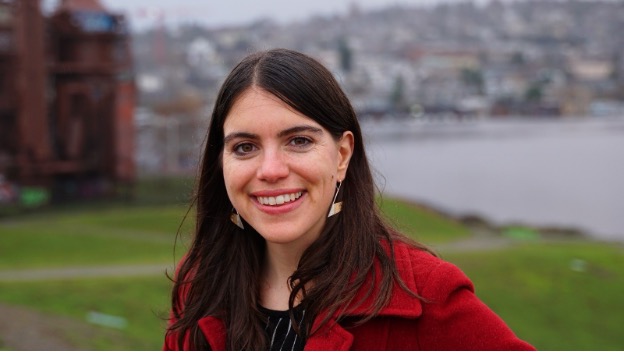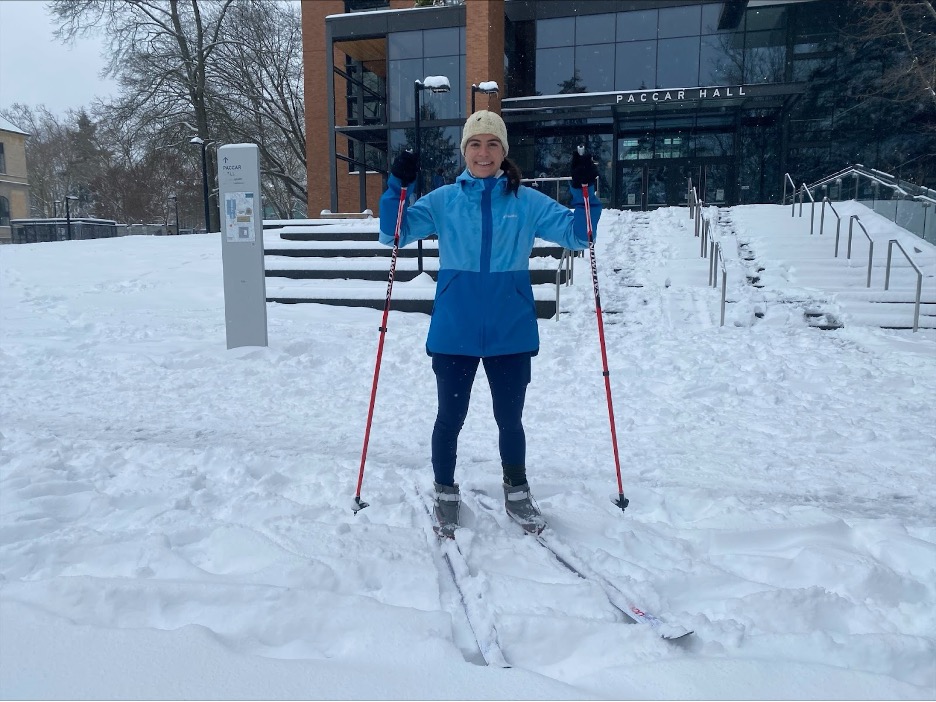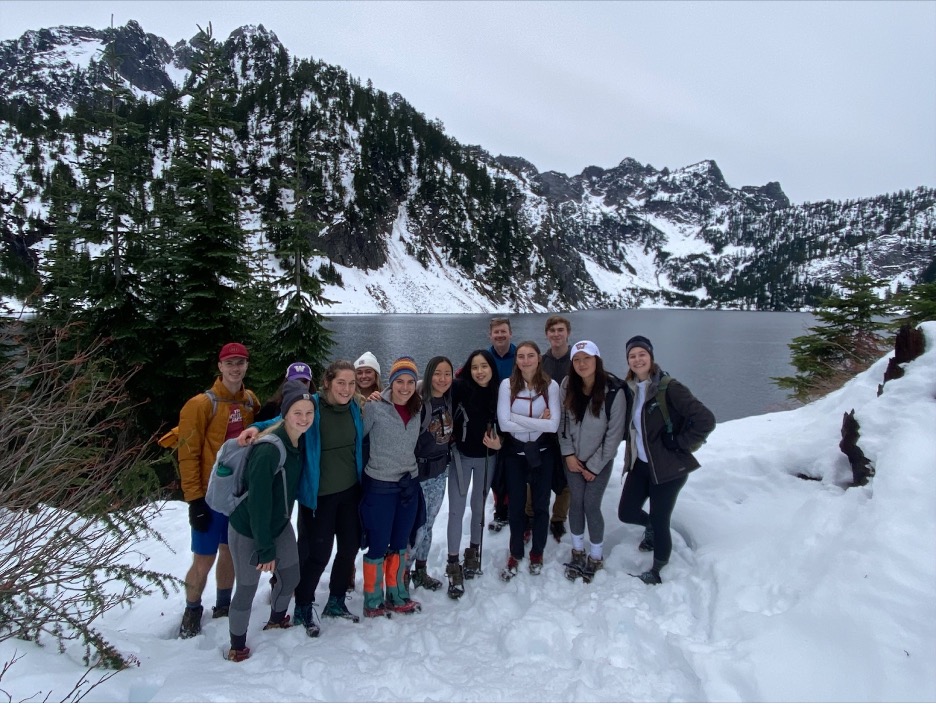Foster Entrepreneurship Faculty Spotlight – Alicia DeSantola
Get to know Alicia DeSantola, Assistant Professor of Management and Organization and Helen Moore Gerhardt Faculty Fellow in Entrepreneurship at the Foster School of Business, who teaches the MBA elective course Entrepreneurial Strategy.

Please tell us a bit about your background.
I have bicoastal roots— I joined Foster in 2019 after completing my PhD at Harvard Business School, but prior to that I had spent eight years studying and working in the San Francisco Bay Area. My time embedded in the Silicon Valley and Boston entrepreneurial ecosystems sparked much of my interest in topics related to entrepreneurship and, in particular, bringing a data-driven approach to the problem of scaling entrepreneurial ventures. My dissertation work at Harvard on scaling was recognized with the Industry Studies Association Best Dissertation Award and was a finalist for the Academy of Management’s Heizer Doctoral Dissertation Award given by the Entrepreneurship Division. I strongly believe in the importance of translating research into practice and have authored case studies and publications in Harvard Business Review. I’ve been fortunate to be named by Poets & Quants as a “Top 50 Undergraduate Business Professor” and to receive the Excellence in Teaching Award (“Professor of the Year”) for Foster’s M.S. in Entrepreneurship program. I also love the elevated conversations we can dig into in our Foster MBA classrooms! Outside of academia, I enjoy outdoor activities such as cross-country skiing, biking, and hiking (my husband proposed to me at the top of Mailbox Peak); fostering dogs through our local humane society; and testing out new recipes in the kitchen, particularly those that involve lots of spice.
What excites you about your subject area and what are some of your research interests?
Much of my research explores the strategic and organizational challenges of scaling up growth-oriented entrepreneurial ventures. Scaling is a challenge that has typically vexed entrepreneurs, and one that I’ve personally watched many friends and entrepreneurs struggle to tackle! To date, most entrepreneurs have needed to rely on anecdotes and war stories when seeking advice on scaling up because there is a dearth of data and systematic evidence. My research aims to help bridge that gap.
Which factors influenced your decision to join UW Foster?
The Foster School of Business has one of the most prolific groups of scholars generating evidence-based knowledge about entrepreneurship. The opportunity to join such an outstanding group of colleagues was thrilling. More broadly, Seattle has a thriving and ever-growing entrepreneurial ecosystem: I strongly believe in the importance of building bridges between the classroom, academic research, and practice, and it’s a privilege to be embedded in such a rich entrepreneurial environment. On a personal note, for an outdoors lover, it’s hard to rival the unique combination of the vast mountain ranges and expansive bodies of water that the PNW has to offer!

DeSantola skiing to campus via the Burke-Gilman on one of Seattle’s rare snow days
What do you find meaningful about your time thus far at Foster?
Entrepreneurship students at Foster are inherently problem solvers who are interested in identifying and building solutions to challenges in the world around them. It’s a joy to get to work with such creative and engaged individuals—the entrepreneurial spirit is essential to tackling some of the most difficult dilemmas faced by the world today.
How does your work align with Foster’s purpose? Purpose statement: Together…We Foster Leaders; We Foster Insights; We Foster Progress…To Better Humanity.
Entrepreneurship can be a positive engine for fostering social and economic progress. It is my hope that the topics that we cover in our entrepreneurial strategy classroom can help foster a better tomorrow for us all.
How is your teaching influenced by instructional best practices?
My approach to entrepreneurial strategy is very much evidence-based: We talk about what works and doesn’t work for entrepreneurs according to what the data says and why! I enjoy bringing my current research into the classroom.
How do you maximize learning and keep students engaged?
I view the classroom as an interactive conversation space where students learn by engaging in a dialogue not just with me, but also with each other and with members of the broader entrepreneurial ecosystem. I endeavor to bring lots of guest speakers from the Seattle entrepreneurial ecosystem into that conversation and our classroom discussions are often quite lively.
One tool I enjoy employing in the class is a “live case.” In a live case, I invite a founder or entrepreneurial leader to present a real-time dilemma faced by their business to the class. Students engage in Q&A and then provide a written assessment of what they think the protagonist should do. This offers students the unique opportunity to assess what to do in the face of the constraints many entrepreneurs encounter such as uncertainty, limited resources, and tradeoffs between courses of action.
Are you currently doing work outside of Foster that influences what happens in the classroom?
I currently serve on the advisory boards of a few startup companies— including some started by my former students. Hearing the day-to-day challenges and concerns of entrepreneurs helps keep me up to date with the evolving entrepreneurial ecosystem and informs the topics we discuss in class.
How have your relationships with industry experts influenced what happens in your class?
One of my goals for the class is to connect students at Foster with members of the Seattle entrepreneurial ecosystem: Typically, my classes feature founders, CEOs, early team members, and venture capital investors as guest speakers. I hope that this helps students engage with and become more deeply embedded in our region’s thriving entrepreneurial community.
How will students apply the knowledge and skills they gain in your classroom in their careers?
To borrow Howard Stevenson’s definition, entrepreneurship is the pursuit of opportunity without regard to resources currently under control. That means that topics related to entrepreneurial strategy are broadly applicable to most career paths, whether students aspire to lead an established company or start one of their own. In entrepreneurial strategy, we learn how to act strategically under a unique set of constraints—background conditions of uncertainty, resource scarcity, and while navigating nascent markets or nascent product categories. This requires a unique skillset. The final group project in the class asks students to think strategically about any opportunity of their choice, whether they see that opportunity as presenting itself to a large incumbent or a new venture. Students can take advantage of the project to flesh out an idea they’ve been working on for themselves or perhaps one they’ve been thinking about for their team in their workplace.
Please tell us briefly about the structure of your elective course – what can students expect to master by the end of it?
Acting strategically in entrepreneurial settings often demands tackling uncertainty, rapid iteration and experimentation, and acknowledging the “rules” of the game are not yet fixed and are open to shaping. The objective of Entre 510 is to identify and understand fundamental strategic principles that influence success in entrepreneurial settings. In particular, the course will emphasize developing an understanding of which types of decisions made by entrepreneurs have strategic implications. Core topics include: business model design, entrepreneurial experimentation, product-market fit, nascent vs. established markets, resource and value paths, scaling, competitive dynamics, and end games.
Any tips for incoming MBAs on how they can brush up on skills/knowledge over the summer?
If I were starting an MBA today, I’d be paying a lot of attention to what’s going on with generative AI and large language models. I predict that we are in the midst of a technological discontinuity akin to the advent of the internet or the smartphone. I foresee numerous opportunities to take advantage of that technological discontinuity and act entrepreneurially for those who can think creatively about this change.

UW student group “Peaks and Professors” on an 11 mile snow hike via Snow Lake.
